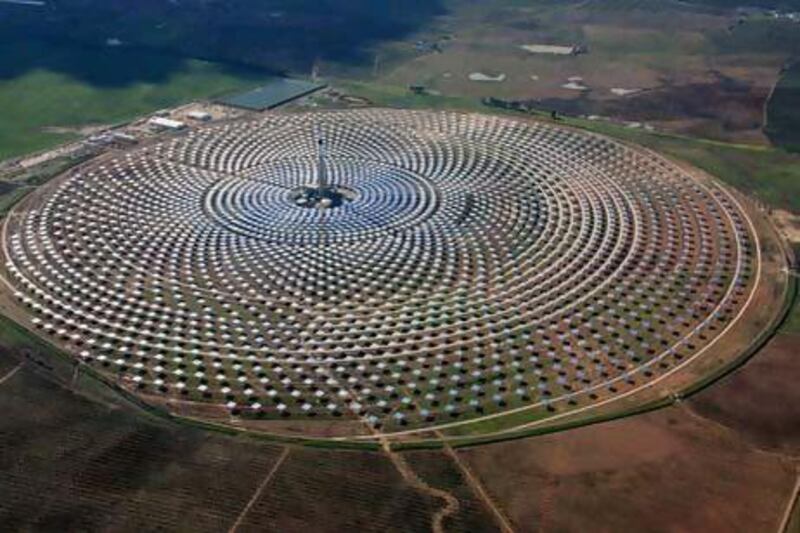A Spanish solar plant built by an Abu Dhabi company is set to power homes even during the night.
More Business news: Editor's pick of today's headlines
Last Updated: May 25, 2011
Industry Insights // Tablets not bitter pill for laptops Devices such as Apple's iPad are increasingly popular, but across the GCC Samsung has been experiencing enormous growth in sales of its laptop computers this year. Read article
Abu Dhabi's Gasco to offer 1,800 jobs in big expansion Abu Dhabi Gas Industries hopes to hire hundreds of engineers and technicians as part of a major expansion ahead of large projects. Read article
Aabar to issue €750m of bonds linked to DaimlerAabar Investments launches a €750 million bond linked to Daimler shares. Read article
[ More business ]
Masdar, which is owned by Mubadala Development, and a Spanish joint venture partner have completed the final tests on a solar plant in Seville, in southern Spain. Mubadala is a strategic investment company owned by the Abu Dhabi Government.
Thousands of mirrors at the plant concentrate the sun's energy on a single tower holding molten salt, which developers believe is so effective at retaining heat that it will be able to produce power 24 hours a day from March to October.
"We're basically decoupling the solar [input] from the electricity generation," said Frank Wouters, the director of Masdar Power.
The tower is the first part of Masdar's €1 billion (Dh5.18bn) investment in Spanish power production. That includes two 50 megawatt solar parks being built by Torresol Energy, Masdar's 40-60 joint venture with the Spanish engineering company Sener. The Spanish Institute for Energy Diversification and Saving, the country's renewable-energy agency, welcomed the development and said it hoped for further investment by Abu Dhabi in the country's renewables sector.
"We are expecting more than €60bn will be needed in order to develop the amount of renewable technologies we are looking for," said Isidoro Tapia Ramirez, the agency's general secretary. "Once they know the Spanish market and how the Spanish demands develop and how friendly we are to the development of the renewables sector, I'm sure they will find new projects to develop."
Masdar, which has been tasked with moving Abu Dhabi towards a low-carbon economy, has some US$5bn (Dh18.36bn) worth of renewable-energy projects under way from the deserts of the Western Region to the waters of the Thames Estuary in London.
The three solar plants in Spain were planned during a period when producers of solar energy benefited from a generous government subsidy. And although in December the Spanish government cut back the payments in light of the country's economic crisis, Masdar said its solar plants were still commercially viable.
"The projects that we have embarked upon were very solid," said Mr Wouters.
"Even with the crisis, there was still demand for power; there were still requests to modernise the power base. The three plants that we have there are rock-solid, so nothing has affected us there in that sense.
"All our projects are commercial. Whether they are here or abroad, they are commercial."
Masdar estimates the solar tower will help reduce carbon dioxide emissions by 30,000 tonnes a year. Some 25,000 homes are expected to be powered by the plant, which was backed by €171 million of financing from European banks.
Solar towers are part of a family of solar technology that uses mirrors to concentrate the energy of the sun to heat a liquid such as water or oil. The molten salt used in the Spanish power tower can be heated to higher temperatures - as much as 400°C - and is believed to retain heat longer.
Blogs: The Grid
Last Updated: May 25, 2011
Fuelling debate Read The Grid blog for the latest from the evolving world of energy . Read blog
The problem with salt, which has not been widely used in the solar field, is that it can solidify at extremely high temperatures, said Robert Armstrong, a chemical engineering professor at the Massachusetts Institute of Technology.
"In practice we haven't been able to do that because of imperfections, variations in cloud cover," said Prof Armstrong in a talk in Abu Dhabi.





